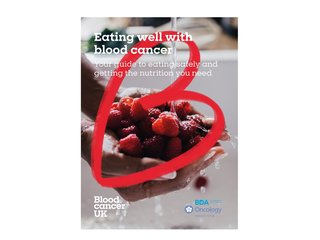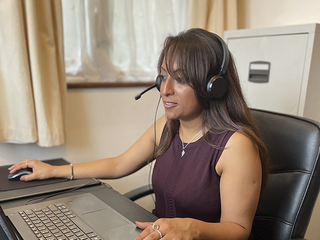Blood cancer and food: your questions
There's no evidence that any special diet or food can prevent or cure blood cancer. On this page we answer frequently asked questions about diet and blood cancer, and explain the facts behind some common diet and cancer myths.
What can I eat to boost my immune system?
There’s no single diet or "superfood" that’s proven to support your immune system. The best thing you can do is eat a wide range of foods to get lots of immune-boosting vitamins and minerals.
There are lots of nutrients that are important for our immune system to work well. Most people can get everything they need by eating a balanced diet including:
- A wide range of different fruits and vegetables – this will help you get lots of different vitamins, minerals and fibre.
- Sources of calcium – like milk, yogurt and cheese, or fortified dairy-free alternatives.
- Nuts and seeds, pulses, meat, fish, eggs, fortified yeast extract and fortified breakfast cereals – for important vitamins and minerals like B vitamins, iron and zinc.
If blood cancer treatment makes it difficult to eat, your body might be low in some nutrients. If you’re worried about this, you can ask your GP or hospital doctor to refer you to a dietitian. They will be able to look at your diet, and may recommend eating more of certain foods or taking supplements.
More information about gut health and your immune system
There’s growing evidence that having a healthy gut microbiome plays an important role in our immune system. Our gut microbiome is the range of good bacteria and other tiny organisms that live in our digestive system.
The best way to have a healthy gut microbiome is to eat a wide range of plant-based foods that are rich in fibre, including:
- fruit and vegetables
- nuts
- seeds
- wholegrains
- beans and lentils.
A lot has been written about probiotic foods and supplements in relation to gut health. Probiotics are live bacteria and yeasts promoted as having health benefits. More evidence is needed to confirm what role probiotics have in gut health and the immune system.
Doctors don’t usually recommend probiotics if you’re neutropenic or your immune system is suppressed. This is because there is a possibility that the bacteria in them could cause infection. And we don’t yet know enough about which types of probiotics are beneficial for people having treatment for blood cancer.

Your guide to eating well
Get your free booklet all about eating well with blood cancer. Includes information on having a balanced diet, food safety and tips to help with eating problems.
Should I cut out sugar?
There’s no evidence that cutting out sugar slows cancer growth or prevents cancer starting.
You might have heard a myth that sugar fuels cancer, but it’s not that simple. Here are some key things to know about sugar and cancer:
- All the cells in our body use glucose (a form of sugar) for energy. This applies to healthy cells and cancer cells.
- There’s no way to tell the body to give glucose just to healthy cells, and not cancer cells.
- Even if you were to cut out all foods containing glucose, your body would still convert other sources of energy (like muscle and fat stores) into glucose. It’s very efficient at getting the glucose it needs!
In summary, there’s no way to stop cancer cells getting glucose by making changes to our diet. And following a restrictive diet to avoid all sugar could be harmful, as it can stop you getting all the energy and nutrients your body needs.
Having lots of sugary food and drink increases the risk of obesity and causes tooth decay. So health experts recommend everyone should limit the amount of sugar in their diet. But occasional sugary treats, as part of a balanced diet, should not cause you any harm.
Cancer Research UK has an article explaining the science behind sugar and cancer.
Are there any foods I need to avoid if I have blood cancer?
If you have neutropenia (a low level of white blood cells called neutrophils) your hospital team might recommend avoiding some foods that have a higher risk of carrying harmful bacteria. This is because neutropenia affects your immune system, making it harder to fight off infections.
Some foods and supplements can interact with blood cancer treatment, affecting how well it works or making side effects worse. For example, grapefruit and Seville oranges and their juice can affect the way some chemotherapy drugs and targeted therapies work.
Ask your healthcare team if there are any foods you need to avoid with your treatment. You should be given a patient leaflet with any drugs prescribed for you, and this will also say if there is any food or drink you need to avoid.
Should I take vitamin or mineral supplements?
If you’re able to eat a variety of foods, you should get most of the vitamins and minerals you need from your diet without needing to take supplements. The exception to this is vitamin D, which we mainly get through sunlight. You can read more about vitamin D further down this page.
If you have a low appetite, you may need supplements to get all the vitamins and minerals you need. Your doctor or dietitian can let you know if they recommend supplements.
It’s important to remember that some vitamins and minerals can be harmful when taken in high doses and can react with some medicines and cancer treatments. Ask your dietitian, doctor or pharmacist for advice before taking any supplements.
Vitamin D
The NHS says everyone living in the UK should consider taking a daily vitamin D supplement of 10 micrograms during the autumn and winter months from October to March. This is because the sun is not strong enough during this time to make all the vitamin D we need.
Some people may not get enough vitamin D from sunlight, even during spring and summer. You might need to take a daily vitamin D supplement throughout the year if any of these things apply to you:
- you come from an African, African-Caribbean or south Asian background
- you spend a lot of time indoors
- you usually wear clothes that cover a lot of your skin – your healthcare team might have advised you to do this if your treatment makes your skin more sensitive to sunlight.
Ask your healthcare team if they recommend taking a vitamin D supplement.
Are there any special foods or diets I should eat?
There’s no evidence that any diet or food can prevent, treat or cure leukaemia, lymphoma, myeloma or any other type of blood cancer. If you already have a balanced diet, there’s usually no need to make any big changes to the way you eat.
You might hear about alternative diets or "superfoods" for cancer, but there's no good evidence that they help. Often, following an alternative diet could do more harm than good, especially if it means cutting out lots of foods. It’s important to eat a balanced diet with a wide range of foods to get the nutrients and energy your body needs.
You can read more about eating well to support your body before, during and after blood cancer treatment.
We've also put together a list of the foods and diets people commonly ask about, along with any myths and facts associated with them. You can read this below.
Remember, you should always speak to your hospital team, dietitian or GP before making any changes to your diet. Changes to your diet should never be used in place of proven medical treatment for blood cancer.
Alkaline diet
Claim:
The alkaline diet claims to change the acidity level in the body by eating mostly alkaline foods. The theory behind the diet is that cancer cells thrive in an acidic environment, so by making the blood more alkaline you can prevent cancer or kill cancer cells.
Fact:
Researchers have reviewed the evidence around the alkaline diet, and found no evidence that it can prevent or cure cancer. There’s also no evidence that the acidity level of the blood can be changed through food.
As the diet limits the number of foods you eat, you may lack all the nutrients you need to keep you strong and well.
Turmeric
Claim:
There are lots of claims online about potential health benefits of turmeric (a spice used in cooking) and its active ingredient, curcumin. Some sources claim it can cure or help to fight cancer.
Fact:
There is currently no clear evidence in humans that consuming turmeric can prevent or treat cancer. Most evidence comes from research on animals or cells in a lab. It has been looked at in some clinical trials with people, but the studies have been small and have limitations.
Turmeric is safe to use in cooking, but it may cause stomach upset if taken in large amounts. Check with your healthcare team if you want to take turmeric in supplement form, as some supplements could affect how well your blood cancer treatment works. Some supplements sold online have been found to be harmful.
Fasting diets
Claim:
Some people suggest that fasting for short periods, or diets that make the body think it’s fasting, might make chemotherapy work better against cancer cells.
Fact:
Healthcare professionals do not recommend fasting during cancer treatment, because there’s not enough evidence to say it’s helpful. Fasting diets are restrictive and can mean you are not able to get enough energy and nutrients into your body. They can also cause side effects like headaches, hunger, weakness, nausea, light-headedness and weight loss.
Most research about fasting diets has been in the laboratory or in mice, and the studies involving people have been small. Because it hasn't been studied in large numbers of people, we don't know if fasting during chemotherapy treatment is safe or beneficial.
We have more information about religious fasting for people with blood cancer.
Organic diet
Claim:
Some people choose to eat organic food because they worry that chemicals used in standard food production could cause health problems, including cancer.
Fact:
The best thing you can do for your overall health is eat a balanced range of foods, including plenty of fruit and vegetables. When it comes to your health, it doesn’t matter if they are organic or non-organic.
UK food safety laws make sure pesticides are well within safe levels. There’s no evidence that the small amounts of pesticides found in foods increase the risk of getting cancer or affect your prognosis if you have cancer.
It’s a good idea to wash fruit and vegetables before eating, whether they are organic or not. This will remove pesticides and harmful bacteria.
Funding disclosure
The following pharmaceutical companies helped fund an earlier version of this information, but had no input into the content or direction of the project: Janssen-Cilag Ltd.
Read about how we work with the pharmaceutical industry.

Worried about anything or have questions?
If you need someone to talk to, please don't hesitate to contact our Support Service by phone or email.
